
International Journal of Agriculture and Natural Resources
Scope & Guideline
Fostering Innovation in Ecological Practices
Introduction
Aims and Scopes
- Sustainable Agriculture Practices:
Research on sustainable agricultural practices including organic farming, crop rotation, and innovative fertilization methods aimed at increasing productivity while preserving environmental integrity. - Crop Yield Optimization:
Studies focused on enhancing crop yields through various methods such as genetic selection, nutrient management, and innovative agricultural technologies. - Impact of Climate Change:
Investigations into the effects of climate change on agriculture, including modeling and forecasting crop responses under different climate scenarios. - Natural Resource Management:
Research addressing the management of natural resources, including soil health, water use efficiency, and biodiversity conservation. - Food Security and Nutrition:
Exploration of food security challenges and nutritional aspects related to agricultural practices and crop production. - Technological Innovations in Agriculture:
Application of new technologies, such as machine learning and deep learning, in agriculture for disease classification, yield prediction, and resource management.
Trending and Emerging
- Sustainable Food Production:
Research focusing on sustainable food sources, including alternative proteins and biofuels, has gained traction, reflecting a global push towards resource-efficient food systems. - Climate Resilience in Agriculture:
Recent studies increasingly emphasize climate resilience strategies, including adaptive practices to mitigate the impacts of climate change on crop yields. - Use of Technology in Agriculture:
An uptick in the application of advanced technologies, such as machine learning and remote sensing, showcases a trend towards data-driven agriculture and precision farming. - Soil Health and Fertility Management:
Growing interest in soil health and nutrient management reflects the importance of maintaining soil quality for sustainable agricultural productivity. - Integrated Pest Management:
Research into integrated pest management strategies indicates a trend towards environmentally friendly pest control methods, reducing reliance on chemical pesticides.
Declining or Waning
- Traditional Agricultural Practices:
Research on conventional farming methods has diminished, likely due to the growing emphasis on sustainable and innovative practices that align with contemporary agricultural challenges. - In-depth Genomic Studies:
Although genetic studies remain important, there has been a noticeable reduction in publications focusing solely on genomic research without practical agricultural applications. - Historical Agricultural Studies:
Papers analyzing historical agricultural trends and practices are less frequent, as the journal shifts towards more current and applicable research. - Livestock Production Focus:
There appears to be a waning interest in research specifically targeting livestock production, as the journal increasingly prioritizes crop-related studies.
Similar Journals

Frontiers in Agronomy
Empowering Researchers to Transform AgronomyFrontiers in Agronomy, published by FRONTIERS MEDIA SA, is a premier open-access journal dedicated to the dynamic field of agronomy. Launched in 2019, it has rapidly established itself as a leader in the publication of groundbreaking research, holding a distinguished Q1 ranking in several categories including Agricultural and Biological Sciences, Agronomy and Crop Science, Plant Science, and Soil Science as of 2023. With an impressive Scopus ranking that positions it among the top journals in its field, this journal provides a valuable platform for researchers, professionals, and students alike to disseminate and access innovative research and critical insights in agronomy. Every contribution to Frontiers in Agronomy undergoes rigorous peer review, ensuring that high-quality research remains at its core. Accessible to all since its inception, it serves as a vital resource for advancing knowledge and fostering collaboration within the global agronomic community, supporting the quest for sustainable agricultural practices and enhanced crop productivity.

Economia Agraria y Recursos Naturales
Advancing Knowledge at the Intersection of Agriculture and EnvironmentEconomia Agraria y Recursos Naturales, published by UNIV POLITECNICA VALENCIA, EDITORIAL UPV, is a prominent open-access journal that has been serving the fields of agricultural and biological sciences, environmental science, and geography since 2001. With an ISSN of 1578-0732 and an E-ISSN of 2174-7350, this journal is dedicated to publishing high-quality research that contributes to the sustainable management of natural resources and agricultural practices. The journal invites scholars, practitioners, and students to explore and share innovative findings that address pressing environmental challenges. While currently categorized in the lower quartiles (Q4) for various disciplines in 2023, its open-access model ensures wide dissemination and visibility for authors and their work, aligning with the growing trend towards accessibility in academic publishing. Positioned in Spain, Economia Agraria y Recursos Naturales is a valuable resource for those seeking to engage with the intersection of agriculture, environmental studies, and policy planning within a global context.
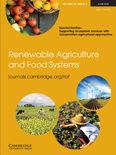
RENEWABLE AGRICULTURE AND FOOD SYSTEMS
Transforming food systems for a sustainable future.RENEWABLE AGRICULTURE AND FOOD SYSTEMS, published by Cambridge University Press, is a leading open-access journal dedicated to the advancement of sustainability in agricultural practices and food systems. With an ISSN of 1742-1705 and an E-ISSN of 1742-1713, this journal spans the interdisciplinary fields of agronomy and food science, achieving a commendable Q2 ranking in both categories for 2023. As it continues to converge through the years from 2004 to 2024, the journal offers a platform for researchers, professionals, and students to disseminate transformative research that addresses the challenges of food security, resource management, and environmental impact. The journal’s significant impact is underscored by its Scopus rankings, situating it in the 77th percentile among agronomy and crop science publications, and the 67th percentile in food science. Since becoming fully open access in 2023, RENEWABLE AGRICULTURE AND FOOD SYSTEMS promotes wider accessibility to vital research findings, fostering collaboration and innovation in the pursuit of sustainable agricultural practices and food systems worldwide.

AGROCIENCIA
Elevating research to meet the challenges of agriculture.AGROCIENCIA, published by COLEGIO POSTGRADUADOS, is a key journal in the fields of agronomy, animal science, and environmental science in Mexico. With an ISSN of 1405-3195 and an E-ISSN of 2521-9766, this journal has been a crucial platform for disseminating research findings since its inception in 2000. Operating from Montecillo, Estado Mexico, it provides an outlet for scholars and practitioners to share innovations and insights that directly impact agricultural practices and environmental sustainability. Despite its current categorization in the Q4 quartile across multiple disciplines, AGROCIENCIA strives to elevate the quality and reach of research, fostering a collaborative approach to tackle pressing issues within the agricultural sciences. Access options are primarily through institutional subscriptions, allowing for a diverse audience of researchers, professionals, and students to engage with the latest studies aimed at advancing knowledge in the agricultural sector. As the journal converges towards its 2024 milestone, it remains dedicated to enhancing scientific inquiry and promoting effective solutions within its discipline.

AIMS Agriculture and Food
Exploring the nexus of food science and agricultural research.AIMS Agriculture and Food is a leading open access journal published by the American Institute of Mathematical Sciences (AIMS), focused on the critical intersections of agricultural and food sciences. Since its inception in 2016, this journal has provided a vital platform for disseminating innovative research and advancements in the fields of agricultural and biological sciences and food science. With impressive Scopus rankings, including a Q2 categorization in 2023 for both Agricultural and Biological Sciences (miscellaneous) and Food Science, AIMS Agriculture and Food is recognized for its significant contributions to the academic community. The journal aims to foster interdisciplinary dialogue by welcoming submissions that tackle contemporary challenges, promote sustainable practices, and enhance food security. Researchers, professionals, and students will find this journal an invaluable resource, offering open access to high-quality, peer-reviewed articles that are essential for informed decision-making in agriculture and food industries.

Transactions of the ASABE
Innovating practices for a resilient agricultural future.Transactions of the ASABE is a premier journal published by the American Society of Agricultural and Biological Engineers, specializing in innovative research and practical applications in the fields of agricultural and biological engineering. With an ISSN of 2151-0032 and E-ISSN 2151-0040, this journal has established a vital niche in disseminating high-quality scholarly content that addresses the complex challenges faced in agriculture and biological systems. The journal operates under an open access model, facilitating broad dissemination of research findings to a global audience. This commitment to accessibility is reflected in its coverage of diverse topics, including agriculture, soil science, food science, and environmental engineering. Although the journal's coverage in Scopus was discontinued in 2021, it once ranked among the top in its categories, indicating its significant contribution to advancing knowledge in these essential fields. Researchers, practitioners, and students are encouraged to engage with the Transactions of the ASABE to stay abreast of developments and foster collaboration in promoting sustainable engineering solutions.
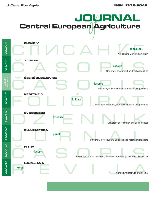
Journal of Central European Agriculture
Connecting Researchers to Transform Central European AgricultureThe Journal of Central European Agriculture, with ISSN 1332-9049 and E-ISSN 1332-9049, is an esteemed platform published by UNIV ZAGREB, FAC AGRICULTURE that caters to the dynamic fields of agronomy, crop science, and animal science. Since its establishment in 2000, this Open Access journal has played a crucial role in disseminating critical research findings while fostering collaboration among academics, researchers, and professionals within the agricultural community. The journal, which is based in the heart of Croatia, spans a rich history of scholarship, with its content available for free to readers and contributors alike. As reflected in its current standings, the journal has achieved a Quartile 3 ranking in Agronomy and Crop Science and Quartile 4 in Animal Science and Zoology for the year 2023, indicating its growing influence within these disciplines. With Scopus ranks placing it in the 32nd percentile among its peers, the Journal of Central European Agriculture is committed to advancing agricultural sciences not only in Central Europe but globally as it prepares for its converged years from 2007 through 2024. This journal serves as a vital resource for innovative research, practical applications, and a deeper understanding of agricultural challenges and solutions.
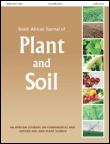
South African Journal of Plant and Soil
Empowering agricultural science through impactful studies.South African Journal of Plant and Soil is an esteemed academic publication dedicated to advancing the fields of Ecology, Plant Science, and Soil Science. Published by TAYLOR & FRANCIS LTD in the United Kingdom, this journal has been a vital resource since its inception in 1984, providing a platform for innovative research and scholarly articles that address critical issues in plant and soil management. With a current impact factor placing it in the Q3 category according to the 2023 rankings, it occupies an influential position within the academic community, especially amongst researchers focused on agricultural and environmental sciences. Although not an open-access journal, it remains accessible to a broad audience through libraries and institutions that recognize its value in facilitating ecologically and environmentally focused discussions. The journal's ongoing commitment to publishing high-quality research ensures that it plays a pivotal role in nurturing knowledge and fostering advancements in sustainable practices across southern Africa and beyond.
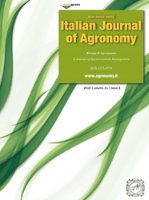
Italian Journal of Agronomy
Bridging theory and practice in agricultural innovation.The Italian Journal of Agronomy is a prestigious, peer-reviewed outlet dedicated to advancing research and scholarship in the field of agronomy and crop science. Published by PAGEPRESS PUBL in Italy, this journal is committed to providing a platform for the dissemination of high-quality research since achieving its Open Access status in 2006. With an ISSN of 1125-4718 and an E-ISSN of 2039-6805, it is recognized for its contribution to the scientific community, boasting a commendable Q2 category ranking in Agronomy and Crop Science as of 2023. The journal's impressive Scopus ranking places it in the 75th percentile within General Agricultural and Biological Sciences and the 69th percentile in Agronomy and Crop Science, reflecting its significant impact and relevance. Covering a wide range of topics relevant to agriculture, from sustainability practices to innovative farming techniques, the Italian Journal of Agronomy serves as an essential resource for researchers, professionals, and students seeking to enrich their knowledge and contribute to the advancement of the agricultural sciences.
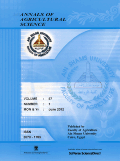
ANNALS OF AGRICULTURAL SCIENCES
Unveiling the Science Behind Sustainable AgricultureANNALS OF AGRICULTURAL SCIENCES, published by Elsevier, stands as a leading open access journal dedicated to the multifaceted field of agricultural sciences. Since its inception in 2011, this journal has served as a pivotal platform for the dissemination of high-quality research, covering areas such as agronomy, animal science, horticulture, food science, plant science, and soil science. With an impressive Q1 ranking across multiple disciplines and notable positions in Scopus Ranks—including #6 in Animal Science and Zoology and #3 in Horticulture—this journal is recognized globally for its significant contribution to advancing agricultural innovations. The journal caters to a diverse audience of researchers, professionals, and students, providing them with open access to cutting-edge studies that address critical issues in agricultural productivity and sustainability. Its commitment to high-impact research ensures that articles contribute meaningfully to the scientific community, fostering advancements in agricultural practices and policies.